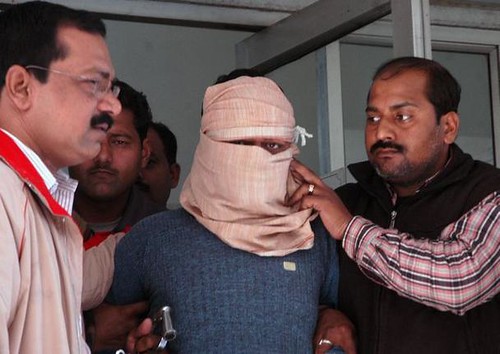By TwoCircles.net Staff Reporter,
New Delhi: The Saket District court today deferred the sentencing of Shahzad Ahmed till 2.0 pm tomorrow in connection with the 2008 Batla House alleged shootout.
On Thursday, Additional Sessions Judge Rajender Kumar Shastri had found Shahzad Ahmed guilty in the Batla House encounter case on charges of obstructing public servants in discharge of duties, murder of Inspector MC Sharma and attempt to murder, and Monday was fixed for the announcement of the quantum of punishment.
Special Public Prosecutor Satwinder Kaur sought death penalty for Shahzad sighting the Citing Supreme Court verdicts in Devenderpal Singh Bhullar and Ajmal Kasab, as few residents of the Paharganj had gathered out seeking death penalty. Paharganj was one of the site, where serial blasts had occurred on September 13, 2008.
Defence counsel Satish Tamta, however, urged the bench for leniency as he only 20 year old at the time of purported crime. The Additional Sessions Judge Rajender Kumar Shastri reserved the order till tomorrow. The quantum of punishment will now be announced tomorrow at 2.00 pm.
In 2008 on 19th September, on 4th floor of L-18, Batla House in Delhi’s Jamia Nagar area, two youths of Azamgarh – Atif Amin and Mohammad Sajid – were killed in a shootout, which was later claimed to be an encounter by special cell of Delhi police. In this shootout, one of the officers of Delhi police Inspector Mohan Chand Sharma also lost his life. However, from the very first day Human and Civil Rights’ organistions and activists are demanding an independent judicial enquiry into the shootout. The postmortem report of the deceased also pointed towards the encounter being a fake one.

File photo of Shahzad Ahmed (Courtesy: The Hindu).
The judgement has come as a big relief to the Delhi Police as the court has accepted the police version of the operation.
Shahzad Ahmed, Special Cell of the Delhi Police, claims was one of the occupants in the L 18 house in the Batla House, where the alleged encounter took place on September 19, 2008, six days after serial blasts in the city. According to the prosecution, he fired at least two rounds and then flee from the scene.
Shahzad had, however, retracted from this police confessions and denied all charges and claimed that he was innocent and have been falsely implicated in this case. He had denied that he was in the flat at the time of the encounter or that he fired on police. He also told the Additional Sessions Judge that he was picked up by the ATS Lucknow from his house in Azamgarh and that his family had also lodged a complaint for kidnapping
The prosecution, in its final arguments, contended that it had “sufficient circumstantial evidence” and phone records to prove that Ahmad was present in the flat in Batla House.
Shahzad’s defence counsel and the civil society groups have been arguing that the L-18 flat in Batla House area has only one exit which was manned by police people; there is no possibility to escape by jumping. Anyone attempting that would only break his bones. Further that the local police was not informed in time and that the FIR was filed very late. They have noted several other loopholes in the police version. The prosecution has not been able to produce any credible evidence against Shahzad that proves his connection with the Indian Mujahedeen.
Dr. Javed Akhtar, President Association for Welfare, Medical, Educational and Legal Assistance (AWMELA), that is fighting the case on behalf of Shahzad has exprssed his “disappointment on the conviction,” but added that after discussing the fine prints of the judgement, they will appeal against the judgement in the High Court.
Related:
Civil rights groups dismayed and disappointed at Batla House judgement
Batla house judgement: Questions remain as court accepts police version and their explanations too
